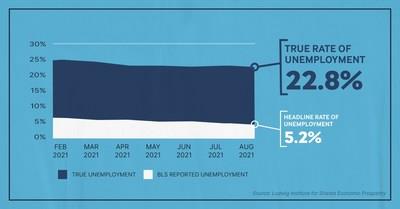
'Functional Unemployment' Drops to Lowest Rate in Nearly Two Years
LISEP's True Rate of Unemployment (TRU) for August revealed that the percentage of "functionally unemployed" Americans -- defined as those seeking, but unable to find, full-time employment paying above the poverty level -- dropped to 22.8%, a 0.6 percentage point decline. This is the lowest TRU since the 22.7% rate posted in December 2019, three months before the onset of the COVID-19 pandemic.
"Workers in traditionally lower-paying positions, many of whom were considered essential during the pandemic, are finally seeing compensation that approaches their contribution, and that is reflected in this month's numbers," said LISEP chairman Gene Ludwig. "The implications of this development are tremendous -- this means literally thousands of individuals are now able to better provide for their families."
Ludwig, who served as U.S. Comptroller of the Currency from 1993-1998, noted that a major driver in the improved TRU lies with industries traditionally paying lower wages -- such as retail, hospitality, and food service -- and a trend among these sectors to increase starting wages to compete for the best workers as the nation emerges from the pandemic recession.
"This is a very positive development for low- and middle-income families, and indeed for the economy as a whole," Ludwig said. "A rising tide should lift all boats."
In fact, all major demographics enjoyed an improvement in the August TRU rate, led by Black workers with a 1.1 percentage point decrease, from 29.8% to 28.7%. The TRU for Hispanics decreased from 25.4% to 25.1%, while the White TRU rate dropped from 21.6% to 21.2%. The TRU for men dropped a full percentage point, from 19.2% to 18.2%, while the rate for women dropped a more modest 0.4 percentage points, from 28.3% to 27.9%.
Among educational groups, those with advanced degrees saw the biggest improvement, with the TRU dropping from 12.8% to 10.4%, a 2.4 percentage point improvement. This was followed by those with some college but less than a bachelor's degree, dropping from 26.2% to 25.1%, and those who ended their education with a high school diploma, with the TRU dropping from 26.6% to 25.8%. Two groups, however, saw an increase in TRU: those with no high school diploma, from 46.0% to 47.7% (a 1.7 percentage point increase), and those with only a bachelor's degree, from 15.8% to 16.1% (a 0.3 percentage point increase).
Overall, Ludwig said, it is a good report that bodes well for the near-term future of the economy.
"The economy is moving in the right direction, which indicates current policy initiatives are working to improve conditions across the board -- not just for a select few," Ludwig said. "It is important to keep the momentum going, and that begins with the pending legislation aimed at investing in the people and infrastructure critical to move the economy forward."
About TRU LISEP issued the white paper "Measuring Better: Development of 'True Rate of Unemployment' Data as the Basis for Social and Economic Policy'' upon announcing the new statistical measure in October 2020. The paper and methodology can be viewed here . LISEP issues TRU one to two weeks following the release of the BLS unemployment report, which occurs on the first Friday of each month. The TRU rate and supporting data are available on the LISEP website at .
About LISEP LISEP was created in 2019 by Ludwig and his wife, Dr. Carol Ludwig. The mission of LISEP is to improve the economic well-being of middle- and lower-income Americans through research and education, and seeks to advance the dialogue around policy solutions to improve the well-being of all Americans.
About Gene Ludwig In addition to his role as LISEP chair, Gene Ludwig is founder of the Promontory family of companies and Canapi LLC, a financial technology venture fund. He is the CEO of Promontory MortgagePath, a technology-based mortgage fulfillment and solutions company, and chairman of Promontory Financial Group, now an IBM Company. Ludwig is the former vice chairman and senior control officer of Bankers Trust New York Corp., and served as the U.S. Comptroller of the Currency from 1993 to 1998. He is also author of the book The Vanishing American Dream , which investigates the economic challenges facing low- and middle-income Americans. It was released in September 2020 by Disruption Books.
SOURCE Ludwig Institute for Shared Economic Prosperity
Related Links

Legal Disclaimer:
MENAFN provides the
information “as is” without warranty of any kind. We do not accept
any responsibility or liability for the accuracy, content, images,
videos, licenses, completeness, legality, or reliability of the information
contained in this article. If you have any complaints or copyright
issues related to this article, kindly contact the provider above.

















Comments
No comment